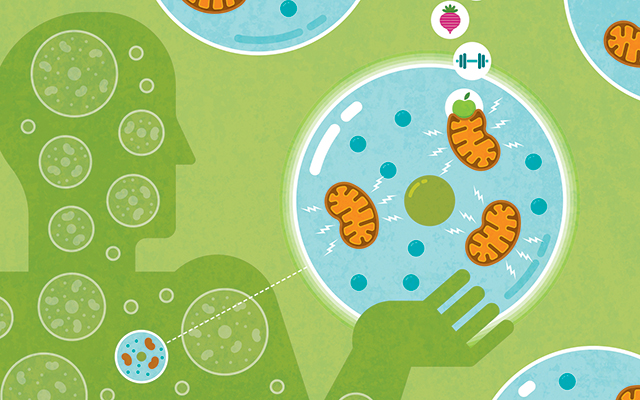Shelley Rubalcava was working 60 hours a week as the regional general manager for a major retail chain in Los Angeles. She was commuting 70 miles to and from her job each day — usually in rush-hour traffic. As if work wasn’t enough pressure, she was caring for her uncle, who suffered from liver failure, and her grandfather, who had just had a stroke. Her friends were amazed. They called her “the Energizer Bunny.”
But while Rubalcava was running around on hyperdrive, the collateral damage to her system was accumulating. Sugary pick-me-ups, caffeine-laden sodas and copious amounts of coffee were getting her through the day. And, she wasn’t sleeping enough.
Then, just as she was starting a new job and moving in with her boyfriend, her uncle and grandfather died within weeks of each other. Rubalcava was beyond exhausted: “I would wake up in the morning, tell myself I feel like crap, and then just keep going,” she says.
What finally stopped her in her tracks was a nasty cold that lingered throughout the autumn of 2005. She started coming home from work and crawling straight into bed, waking only the next morning and going straight back to work.
One afternoon, one of her employees found her asleep in a back storeroom. When Rubalcava finally went to the doctor, she was diagnosed with infectious mononucleosis and put on a heavy-duty round of steroids.
Instead of getting better, she got worse. “That was the turning point,” she says. “I was running on empty, and the steroids just zapped me. My body just stopped.” She began sleeping more than 20 hours a day. “I would tell myself, ‘Shelley, just get up! Get up! Just go to the bathroom, and then you can come right back to bed.’”
“It was like a conscious coma,” she says. “My mind was aware, but I just didn’t have enough energy to do anything.”
During the next three years, Rubalcava visited more than 25 doctors in Los Angeles, filling a huge banker’s box with lab tests, charts and MRI scans. One doctor told her she might have a tumor; another said the cause was poor circulation. Finally, Rubalcava found a holistic doctor who told her she was suffering from severe adrenal fatigue. Simply put, Rubalcava had run her body’s energy-production system into the ground.
The Doctor Debate
Adrenal fatigue — or non-Addison’s hypoadrenia, as it is known in some circles — is not a widely accepted diagnosis in medical schools or among most conventional physicians. It is not Addison’s disease, a rare condition in which the adrenal glands completely fail. Rather, it’s a milder syndrome in which the adrenal glands slow and sputter, like a computer bogged down with too much spyware.
Adrenal fatigue doesn’t have a popular or profitable drug attached to it. It doesn’t even have an International Classification of Disease (ICD) number, which all doctors’ offices and insurance companies use to process claims. “Get together 20 random physicians, and I doubt if you’ll find one who has heard of it,” says Jacob Teitelbaum, MD, medical director of the national Fibromyalgia and Fatigue Centers and author of Beat Sugar Addiction Now!.
And yet, an emerging, disparate group of doctors is attempting to raise public consciousness about what they believe is an epidemic of adrenal fatigue in the United States. One of these doctors is James Wilson, ND, PhD, author of Adrenal Fatigue: The 21st Century Stress Syndrome. When Wilson considers the way most Americans live — economic stress, the 24/7 workday, the popularity of caffeine and sugar, ever-growing traffic congestion, and so on — he sees the potential for a lot of worn-out adrenal glands.
“When I describe the condition to big crowds of people, I can see about two-thirds of the heads in the audience nod in agreement with what I’m saying,” says Wilson. “That’s not very scientific, but it gives you an idea of how common this really is.”
More than 80 percent of the population suffers from this syndrome, according to Marcelle Pick, RNC, MSN, OB/GYN, NP, author of Are You Tired and Wired? Your Proven 30-Day Program for Overcoming Adrenal Fatigue and Feeling Fantastic Again. And yet, she adds, many in the medical community do not recognize the condition because “in our medical system, you have a diagnosis: You’re either sick or you’re well, and there is no in-between.”
“We in Western medicine don’t know how to recognize a problem until it has manifested as a ‘disease.’”
“We in Western medicine don’t know how to recognize a problem until it has manifested as a ‘disease,’” concurs Frank Lipman, MD, author of Revive: Stop Feeling Spent and Start Living Again. “It’s a lot like brake pads — until brake pads have worn down completely, you don’t know that they are wearing down.”
Whether or not you accept adrenal fatigue as a syndrome, it is certainly a matrix of symptoms that many experts agree are reaching epidemic proportions — and the basis of it is hormonal disruptions resulting from chronic stress. Wilson and Teitelbaum do believe that if humans continue their frenetic pace for a few more millennia, our endocrine systems will eventually evolve to keep up with us. But for now, the doctors agree, our adrenal glands are stuck in prehistoric mode.
“Our adrenals evolved to trigger fight-or-flight reactions so that we could fight off a saber-toothed tiger and handle these big chemical jolts once every four to six weeks,” explains Teitelbaum. “They were meant for life-threatening situations, and we’re not at all designed to get these jolts of cortisol every time we think about pending deadlines, or somebody pulls out in front of us in traffic. Some people are so stressed they give themselves more than 100 jolts of cortisol every single day.” (For more on how cortisol affects your energy levels and strategies for managing it, see “How to Balance Your Cortisol Levels“.)
Why Being Wired Makes You Tired
To understand the connection between chronic stress and adrenal fatigue, it helps to know a little more about the body’s two adrenal glands. Each of them weighs about as much as a grape and sits atop each kidney. Their job is to release tiny, precise amounts of chemicals, including cortisol, adrenaline, testosterone, estrogen, aldosterone and DHEA. These chemicals, individually and in concert, help the body in many ways, including responding to stress, maintaining libido, and serving as one of the main control centers of the immune system.
When the body feels a little nugget of stress, the adrenal glands release a tiny chemical cocktail that energizes the body, heightens memory and increases your pain threshold. While empowering in the short term, this chemical infusion can be devastating if frequently repeated. When people are stressed out for days or weeks or months, the body is continually flooded with cortisol and adrenaline, which ultimately results in heightened blood-sugar levels, increased blood pressure and decreased immunity to disease.
If stress continues unabated, the body enters a second phase of adrenal fatigue, when the adrenals simply get exhausted. They just can’t supply cortisol and adrenaline at the same level of production.
“If you have adrenal fatigue, probably the worst thing you can do is consume caffeine and sugar.”
If you reach this point of adrenal overwhelm, you’ll begin to feel fatigued, achy and mentally foggy. In order to trigger the kind of adrenaline high to which you’re accustomed, you might up your intake of stimulants and sugar. But your reaction to stimulants like caffeine will be short-lived, and the pancreas is quick to tamp down sugar rushes with shots of insulin.
That insulin forces blood-sugar levels to plummet, which would normally tell the adrenal glands to release a little more cortisol, giving you some temporary pep. But if the adrenals are depleted, then blood sugar just stays low. You feel even more compelled to reach for that next can of soda, just to keep soldiering on.
“If you have adrenal fatigue, probably the worst thing you can do is consume caffeine and sugar,” says Teitelbaum. “Which is, of course, what most people do, because they tell themselves they just have to keep going, no matter the cost.”
In addition to devastating chronic exhaustion, adrenal dysfunction (as Pick often refers to adrenal fatigue) can ultimately increase your risk of developing a host of conditions, including depressed immunity and autoimmune disorders, digestive problems, cardiac issues, blood-sugar dysregulation, thyroid problems, and wider-ranging hormonal imbalances, says Pick.
Regaining Balance
Because so few doctors recognize the condition, finding a sympathetic physician can be tricky. Go to a mainstream doctor with complaints of under-performing adrenals and a cortisol test may be ordered, says Wilson. But this test is calibrated to detect Addison’s disease. “On the standard cortisol test,” he explains, “you can have 6 micrograms per deciliter, or less than a third of ‘normal,’ and still come back ‘normal’ on the test.” As a result, most mainstream docs aren’t prepared to address adrenal problems until they are quite advanced.
Wilson prefers combining a written questionnaire that lists symptoms of adrenal fatigue with a saliva test, which measures DHEAS, cortisol and levels of sex hormones.
Adrenal fatigue is generally treated with time-honored naturopathic remedies, good nutrition and lots of self-care.
When treating adrenal fatigue, says Pick, the instinct may be to supplement with missing hormones. The real answer lies, however, in correcting the underlying imbalance that is creating the problem. “We have a very reductionist approach to medicine and a very polypharmy approach to our symptoms,” she says. In other words: “The belief is, if you can’t sleep, you need a sleeping pill.”
Adrenal fatigue is generally treated, she asserts, with time-honored naturopathic remedies, good nutrition and lots of self-care. “The way to deal with most of the patients who come to see us today is through lifestyle medicine,” agrees Lipman. (See “8 Natural Solutions” below.)
Shelley Rubalcava agrees. “You have to reevaluate your life, and not allow things that are out of your control to overwhelm you,” she says. Today, Rubalcava actively protects her adrenal health with more yoga, more meditation, and more quiet time alone. “And I don’t push myself,” she says. “If I start feeling overwhelmed, stressed or sick, I clear all my appointments and take a day to myself and rest. I’m never going back to the way I was. I learned the hard way that my health is just too important.”
What Is Adrenal Fatigue?
Adrenal glands release chemicals, including:
- cortisol
- adrenaline
- testosterone
- estrogen
- aldosterone
- DHEA
These hormones help us:
- respond to stress
- maintain libido
- control the immune system
When the body experiences a short-term stress trigger, the adrenals release chemicals that:
- energize the body
- heighten memory
- increase the pain threshold
But when stress lasts for days or weeks, the body is continually flooded with cortisol and adrenaline, resulting in:
- heightened blood-sugar levels
- increased blood pressure
- decreased immunity to disease
If stress persists, a second phase of adrenal fatigue sets in, and the adrenal glands are depleted or exhausted, resulting in overall:
- chronic low energy
- achiness
- mental fogginess
Desperate for quick pick-me-ups, many people turn to sugar, refined carbs (think cookies, crackers, pastries) and caffeine (coffee, soda and energy drinks)
The result? The pancreas responds to the sugar rushes with shots of insulin, which force blood-sugar levels to plummet. This would normally trigger the adrenal glands to release more cortisol. But if adrenals are depleted, blood sugar and energy remain low. Caffeine no longer triggers the desired effect — and may further disrupt proper adrenal function.
Left unchecked, adrenal fatigue not only interferes with proper energy production, but also increases risks of:
- depressed immunity and autoimmune disorders
- digestive problems
- cardiac issues
- blood-sugar dysregulation
- thyroid problems
- hormonal imbalances
- depressed mood, libido and brain function
Symptoms of Adrenal Fatigue
In diagnosing adrenal fatigue, health experts look for a cluster of associated symptoms, including those below. Note that many of these conditions can also be the result of other hormonal or metabolic conditions, so if these symptoms sound familiar, consult a health professional.
- Bone tired
- Hypoglycemic
- Hard time shaking off infections
- Aches
- Low sex drive
- Dry, scaly skin
- Dry hair
- Cravings for sugar, salt and stimulants
- Low blood pressure
- Feeling dizzy or lightheaded upon standing
- Intolerant of cold temperatures
- Feeling significantly better after the evening meal
8 Natural Solutions for Adrenal Fatigue
Think you may be suffering from adrenal fatigue? Don’t rush to the pharmacy. Her are sensible life changes that can help boost your energy levels.
1. Avoid sweet and starchy foods.
Sugar and starchy foods, such as bread, pasta and potatoes, cause your blood sugar to rise quickly, notes Marcelle Pick in her book, Are You Tired and Wired? Your Proven 30-Day Program for Overcoming Adrenal Fatigue and Feeling Fantastic Again. “Because these foods are metabolized so quickly, that ‘sugar high’ is soon followed by a crash. Your liver, pancreas and adrenals are working overtime again, trying to even out your blood sugar, supplying extra cortisol to get those blood-sugar levels back up, and contributing to your stress levels.” Pick suggests eating foods that metabolize more slowly — such as healthy proteins, whole grains, and nonstarchy veggies like broccoli and spinach — and low-glycemic fruits such as berries and pears.
2. Limit caffeine.
As with sugar, your body re-sponds to caffeine with a quick burst of energy. Ultimately, coffee, caffeinated tea, soda and energy drinks will overstimulate the adrenal glands — and keep you up at night. Disrupted sleep further undermines your body’s energy, immunity and healing capacity.
3. Get plenty of rest.
Many people who suffer from adrenal fatigue have trouble getting enough sleep, either because they’re skimping on it, or because their chemical imbalances or stressed-out state impede sleep.You can improve your sleep quality in several ways, including taking a hot bath before bed and taking a dose of L-theanine, which helps create gamma aminobutyric acid, a neurotransmitter that is critical for sleep.In his book Revive: Stop Feeling Spent and Start Living Again, Frank Lipman, MD, suggests keeping your bedroom cool; the lower temperature encourages the production of sleep hormones. He also advises darkening your bedroom completely or wearing an eye mask to encourage continual melatonin production. Also, turn off all cell phones, computers and televisions before bedtime to limit EMF radiation and brain stimulation.
4. Take a good multivitamin.
A variety of nutrients, especially vitamin C and the B-complex vitamins, are critical to adrenal health. Pick recommends taking a high-quality multivitamin, plus calcium and magnesium supplements and a lead- and mercury-free pharmaceutical-grade fish oil.
5. Restore your rhythms.
The adrenal glands rely on a predictable schedule to allot the correct dosages of melatonin (for sleep) and serotonin and cortisol (for waking and energy).
- Wake at the same time every morning.
- Eat an early breakfast to replenish your waning glycogen.
- Eat an early, bigger lunch around 11 a.m.
- Have a snack between 2 and 3 p.m.
- Eat an early, smaller dinner.
- Do not exercise after 8 p.m. (it might interfere with your ability to fall asleep).
- Go to sleep at the same time every night.
“Eventually you want to train your body so that you no longer need an alarm clock,” says James Wilson, ND, PhD. Lipman adds that it is also important to honor nature’s daily rhythms, so striving for at least 30 minutes of sunlight daily (not at peak hours) is ideal. “There is no replacement for sunlight,” he notes, adding that exposure to sufficiently bright light at the appropriate time can help resync our body clock and rhythms.
6. Exercise strategically.
Lipman recommends walking, because it’s an ideal form of restorative (vs. taxing) exercise: “If you have been overexercising, you need to slow down. And, if you have not been exercising, walking is the appropriate way to speed up.” The key to restorative exercise, he adds, is short bursts of energy followed by periods of rest, because this actually triggers the parasympathetic nervous system and creates a feeling of relaxation. “Start walking at a high intensity for one minute, followed by low intensity for three to four minutes. Do this for 30 minutes,” he writes. It’s important to be consistent in your daily practice of restorative exercise, but not to overdo it, he adds. “If you feel tired after moving, you have pushed your body too far. Don’t stop or give up; just cut back a little and build up again more slowly.”
7. Explore healing herbs.
Adaptogens are a group of herbs that help your body fight fatigue and adapt to stress. The most important adaptogens, notes Lipman, are Asian ginseng, Eleuthero, Ashwagandha and Rhodiola rosea. It is important to source from reputable herbalists, since purity can be a concern. (See “Which Adaptogens Work Best to Heal Burnout?” or “Ancient Healers: Adaptogens” for more.)
8. Reflect.
Prioritize relaxing “you” time. “Chinese medicine knows that our emotions are seeded in our physiology,” says Pick. “It’s really important to try to find ways to be present in this crazy, sped-up world, whether it’s by pausing, breathing, meditating or even just by giving multitasking a rest.”
This article originally appeared as “Pick Yourself Up” in the June 2011 issue of Experience Life.



